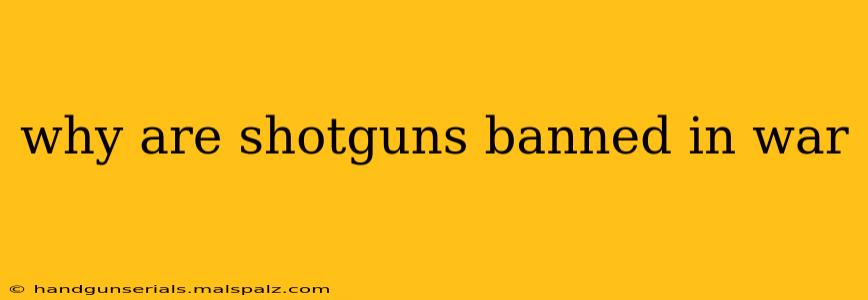Why Shotguns Are Rarely Used in Modern Warfare: A Deep Dive into Effectiveness and Legality
Shotguns, the iconic close-quarters combat weapon, hold a prominent place in popular culture, often depicted as devastatingly effective firearms. However, their presence on modern battlefields is surprisingly limited. This isn't due to an outright ban, but rather a complex interplay of factors rendering them less practical than other weapon systems in large-scale conflicts.
The Limitations of Shotguns in Warfare
While shotguns excel at close-range engagements, the limitations become starkly apparent when considering the realities of modern warfare:
-
Limited Effective Range: A shotgun's spread pattern, while advantageous at close range, drastically reduces its accuracy and effectiveness beyond 25-50 meters (80-160 feet). In open warfare scenarios, this severely restricts their usability compared to rifles with much longer effective ranges. The enemy could easily engage from a distance where the shotgun is completely ineffective.
-
Ammunition Capacity and Reload Speed: Shotguns typically hold a limited number of shells compared to assault rifles or machine guns. Reloading can be slower, leaving soldiers vulnerable during crucial moments of engagement. This lack of sustained firepower is a significant disadvantage in combat situations.
-
Penetration Power: While capable of inflicting significant damage at close range, shotgun rounds often lack the penetration power to effectively engage targets behind cover or through light fortifications. Modern body armor also significantly reduces the effectiveness of shotgun rounds.
-
Weight and Maneuverability: Shotguns, especially those designed for combat use, are relatively heavy and cumbersome, impacting a soldier's agility and ability to maneuver effectively on the battlefield. This is particularly problematic in urban warfare or other close-quarters combat scenarios where maneuverability is crucial.
-
Lack of Versatility: Shotguns are highly specialized weapons. Unlike rifles that can utilize various ammunition types (e.g., armor-piercing, tracer rounds), shotguns generally offer less versatility. This makes them less adaptable to diverse combat scenarios.
Legal Considerations and the Geneva Conventions
While there's no international treaty explicitly banning shotguns in warfare, the rules of engagement and the principles of the Geneva Conventions heavily influence weapon selection. The use of any weapon causing unnecessary suffering is strictly prohibited. While shotguns can be lethal, their comparatively limited range and potential for causing excessive wounds might raise concerns in certain contexts. However, this is not a primary factor in their limited battlefield deployment.
Alternatives to Shotguns in Modern Warfare
The reasons for shotguns' rarity in modern warfare are not about specific bans, but about the overall effectiveness and practicality of other weapons. Assault rifles, machine guns, sniper rifles, and grenade launchers offer superior range, accuracy, firepower, and versatility, making them more suitable for the demands of modern combat.
Conclusion: Practicality, Not Prohibition
In conclusion, the absence of shotguns in widespread use during modern warfare is a matter of practicality and effectiveness rather than explicit prohibition. Their limited range, ammunition capacity, and penetration power, combined with the superior capabilities of other weaponry, make them less suitable for the challenges of large-scale conflict. While they may retain a niche role in specialized close-quarters combat situations, they are unlikely to ever replace the versatility and range offered by other weapons currently favored by modern militaries.

